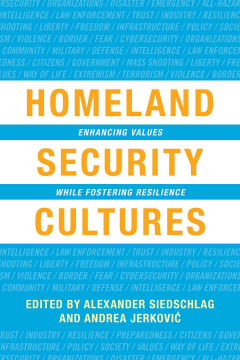
Additional Information
Book Details
Abstract
Homeland Security Cultures: Enhancing Values While Fostering Resilience explores the role that culture plays in the study and practice of homeland security in an all-hazards, whole-community, and all-of-government scope. It does so by analyzing and discussing strategic, organizational, operational, and social cultures in the U.S. Homeland Security Enterprise, as well as from an international perspective. The focus is on how knowledge and interpretation, normative values, common symbols, and/or action repertories inform the evolution of the homeland security mission space and the accomplishment of homeland security functions. Contributions also address institutional changes designed to foster a more coherent common homeland security culture.
This textbook will make a contribution to the evolution of homeland security as a policy area and a field of study by offering actionable insight as well as critical thinking from scholars and practitioners on how cultural aspects matter in balancing security against liberty, in managing complex risks, in enhancing collaboration across sectors, and in explaining how a resilient nation can be fostered while enhancing liberal and democratic values.
Homeland Security Cultures exposes the reader to a unique, insightful inter-disciplinary and multi-disciplinary discussion on security culture, and thus depicts the contribution of different fields of knowledge to its constitutive terminology, theory, paradigm and methodology. The conceptual bandwidth of this term in the book goes beyond the discussion done so far, and possesses an added value of a toolbox for its differential diagnosis.
Rachel Suissa, School of Political Sciences, University of Haifa
Alexander Siedschlag is Professor of Homeland Security at Penn State Harrisburg School of Public Affairs, in a joint appointment as Professor of Public Health Sciences at the Hershey College of Medicine and serves as Chair of Penn State Homeland Security Programs.
Andrea Jerković is Acting Director of the CEUSS | Center for European Security Studies, Austria.
This edited volume provides an intriguing analysis of culture as a variable in understanding homeland security. Focal points include examination of “Domain Aspects” (e.g., culture and resilience), “Collaboration Aspects” (e.g., intelligence fusion centers), and “Societal Security Aspects” (e.g., resilience and a culture of preparedness). The introduction provides a solid overview of the book and the concluding section nicely summarizes key takeaways. A very satisfying work.
Steven Ames Peterson, Emeritus Professor of Politics and Public Affairs, Penn State Harrisburg
Table of Contents
| Section Title | Page | Action | Price |
|---|---|---|---|
| Homeland Security Cultures | Cover | ||
| Contents | v | ||
| List of Illustrations | vii | ||
| List of Abbreviations | ix | ||
| 1 Security Cultures in Action: Introduction and Overview of Chapters | 1 | ||
| Part I: Domain Aspects | 41 | ||
| 2 The Cultural Challenge in Countering Violent Extremism and Counterterrorism | 43 | ||
| 3 Mismanaging America’s Demographic Shift, the Rise of Violent Extremism, and Responding to a Culture of Fear | 65 | ||
| 4 Comprehending the Polar Shift in Border Security Culture: Restoring Effective Sovereignty | 79 | ||
| 5 Putting U.S. Cybersecurity Culture in Perspective | 103 | ||
| 6 Achieving a Culture of Disaster Resilience | 127 | ||
| 7 Designing High-Reliability Security Organizations for the Homeland Security Enterprise | 142 | ||
| Part II: Collaboration Aspects | 163 | ||
| 8 Mass Casualty Shooting Events across America: Examining How Organizational Cultures Adapt to Emerging Patterns from the Homeland Security Perspective | 165 | ||
| 9 The Use of Military Forces in the Homeland: Understanding the Cultures within the Culture | 186 | ||
| 10 Fusion Centers: Bridging State/Local Law Enforcement and National Intelligence Culture | 203 | ||
| 11 Cybersecurity Cultural Conflicts: The Problem of Language within the Homeland Security Enterprise | 219 | ||
| 12 Soft Industrial Policy Measures to Build a Culture of Trust in the Field of Homeland Security: The Case of the European Union | 230 | ||
| Part III: Societal Security Aspects | 257 | ||
| 13 Homeland Security and Civic Culture: The Whole Community and the Citizen | 259 | ||
| 14 Resiliency and a Culture of Preparedness | 280 | ||
| Conclusion and Outlook | 295 | ||
| 15 Homeland Security Cultures to Foster a Resilient Nation while Safeguarding the “Blessings of Liberty” | 297 | ||
| Bibliography | 317 | ||
| Homeland Security Cultures Research Guide | 357 | ||
| List of Contributors | 367 | ||
| Index | 377 |
